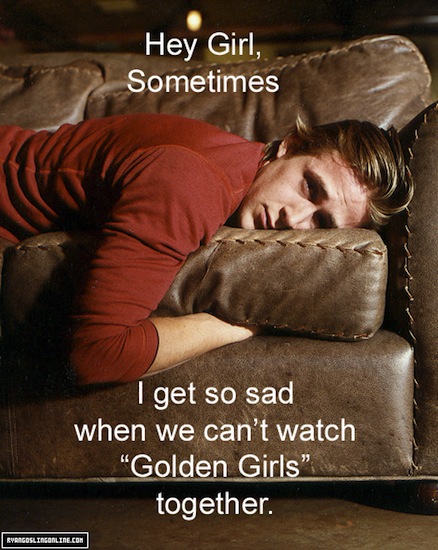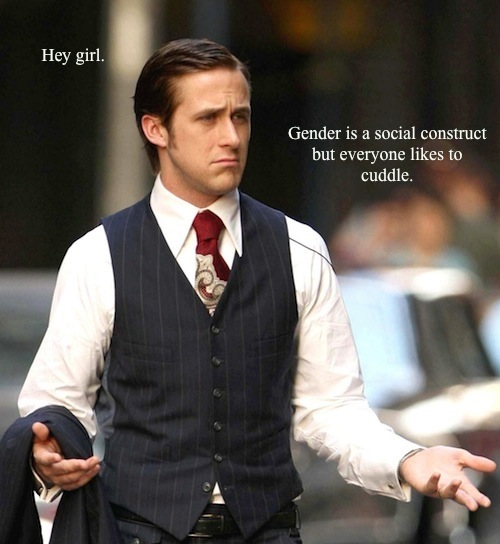
Image Credit: F--- Yeah Ryan Gosling
Some recent procrastinating led me to Jezebel and thus Joey Thompson’s recent YouTube video, in which he teaches men how to look like actor Ryan Gosling. I was intrigued because I have been following the proliferating Ryan Gosling memes for a while—which have gone on long enough that they’ve been accused of jumping the shark. Still, I’d like to take some time to think a little bit about what their newest evolutions might tell us about memes, form, and feminine desire.

Image Credit: Poli Sci Ryan Gosling
In case you don’t know what a meme is, Richard Dawkins first defined it in The Selfish Gene (1976) as “a unit of cultural transmission, or a unit of imitation.” The Internet has lead to the proliferation of memes, from "all your base are belong to us,” to Xzibit Yo Dawg, to the most prolific of them all, the LOLcat. What many memes share is a consistent form: a picture with humorous text superimposed over it. Frequently the memes—like the LOLcat—even use the same fonts to create a visually consistent appearance. What these memes do is to create communities through the shared humor and enjoyment of the same structure. Thus, the LOLcat meme developed certainly consistent cat characters like Ceiling Cat, and further iterations would feature new references to Ceiling Cat.

Image Credit: Rhet/Comp Ryan Gosling
The earliest Ryan Gosling meme started with a humble blog named Fuck Yeah Ryan Gosling, which gained notoriety when Ryan Gosling read several posts from it during two separate MTV interviews. What followed were numerous other Tumblr blogs, including Feminist Ryan Gosling, Typography Ryan Gosling, Silicon Valley Ryan Gosling, Campaign Staff Ryan Gosling, and of course Rhet/Comp Ryan Gosling. The Goslimania culminated in protests against Bradley Cooper when People declared him the Sexiest Man Alive over Ryan. While People will go on to find more sexy men and Gosling more work, I’m left wondering what this decidedly symbolic protest represents.

Image Credit: Feminist Ryan Gosling
Anne Helen Peterson’s excellent post on the topic argues that the Gosling meme only works as long as the pictures support what he says. When it came to versions like Feminist Ryan Gosling, “you could actually imagine Ryan Gosling saying the very phrases that adoring bloggers were photoshopping into his mouth.” However, she argues that versions like Biostatistics Ryan Gosling go too far because they don’t fit the meme. She reads the meme’s appeal in the juxtaposition of star and text, creating connections between Gosling and his fans:
Pairing star images with dense theory is funny. Every scholar wants to think that an object of their desire would be interested in the things they’re interested in — would have a discussion in which you share a secret language familiar to a select few (and then, after you’ve had a good debate, you go to the Farmer’s Market and snuggle). I wish Ryan Gosling’s image wanted to get his PhD in media studies with me. But it doesn’t — he fell in with the gender studies people long ago. That’s where his image belongs. That’s where it works. To take it beyond can be funny……but, if we’re honest with ourselves, misses the point. It’s a meme built on a meme, and thus evacuated of its core.
I agree with Peterson that the attraction lies in projecting shared values onto Gosling, particularly feminist ones. We female academics would like to think (and perhaps have reason to suspect) that Gosling shares our values, and that we could talk Laura Mulvey with him—or Susan Jarrett, or any other topic we enjoy. However, I also suspect that the Gosling meme works best on women of this type: political liberal, feminist, and educated. These viewers appreciates how Gosling’s mild, non-threatening appearance can be endlessly appropriated to fit their desires—which is why the meme’s life has extended so far beyond its original appearance. The Ryan Gosling meme's core lies not in Ryan Gosling, but in his audience.

Image Credit: Hey girl. I like the library too.
Thus, Steve Kolowich’s suggestion that “it is unclear whether the blogs are intended as pure irony or as a genuine experiment to test whether the following gambits stand a chance of working even under optimal conditions” is a complete misreading. None of these women are suggesting that the pickup lines attributed to Gosling in the images would work. Rather, Gosling is a space in which women can vocalize desire. I think this is why the meme has been adapted to include variants like Gael García-Bernal Feminista, Academic Coach Taylor and Fuck No Rick Santorum. If Gael García-Bernal Feminista adds social justice overtones and sensitive floppy hair, Academic Coach Taylor embodies a more authoritative—though equally feminist—intellectual male. Fuck No Rick Santorum explicitly flips Fuck Yeah Ryan Gosling to protest Santorum's sexist political policies. When so much Internet culture is explicitly sexist, the Ryan Gosling Tumblr memes constitute a safe space for feminist—and female heterosexual—discourse.





Recent comments
2 years 29 weeks ago
2 years 44 weeks ago
2 years 44 weeks ago
2 years 50 weeks ago
3 years 4 weeks ago
3 years 4 weeks ago
3 years 4 weeks ago
3 years 6 weeks ago
3 years 6 weeks ago
3 years 6 weeks ago